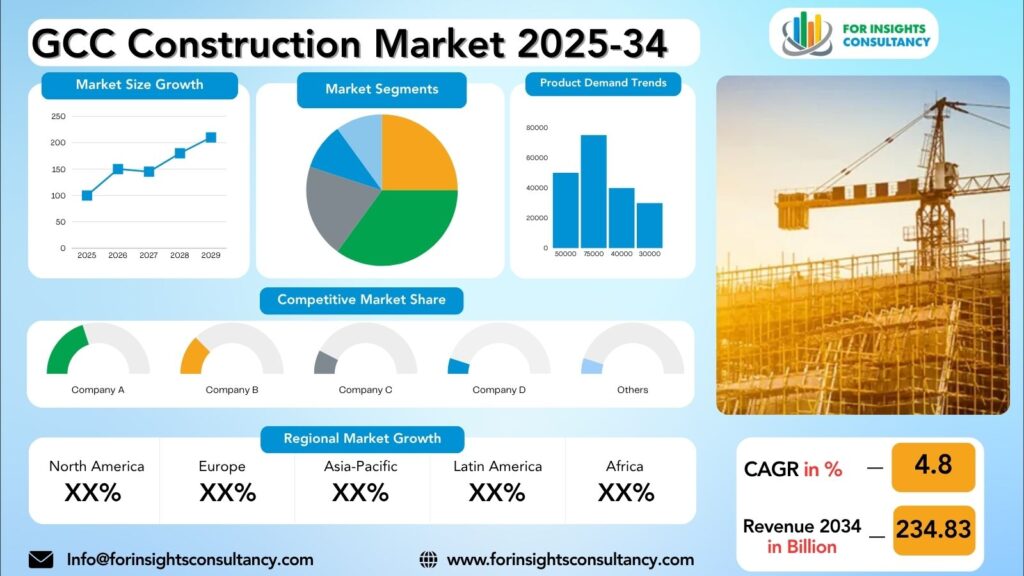
GCC Construction Market Size, Trends Analysis Research Report by public/private sector (Residential Construction, Commercial Construction, Industrial Construction, Infrastructure (Transport) Construction, Energy and Utilities Construction, Institutional Construction, Oil & Gas Construction), and By Region Global Market Analysis And Forecast, 2025-2034
Oct-2025 Formats | PDF | Category: Manufacturing & Construction | Delivery: 24 to 72 Hours
GCC Construction Market Is Forecast to Increase from USD 156.89 Billion In 2025 To USD 234.83 Billion By 2034, At A CAGR Of 4.8%.
GCC Construction Market: A Comprehensive Overview and Future Developments
The GCC construction market is a revolving and prospering area that is substantially contributing to the region’s economic growth. Mainly focusing on infrastructure development, the GCC states are investing a lot of money in construction projects to satisfy their rapidly increasing populations’ needs. Thus, the construction of residential, commercial, industrial, and public infrastructure projects has gone up dramatically.
The future developments in the GCC construction market will be great with the emphasis on sustainability, technological advancements, and innovation. The governments in the region are increasingly getting on board with green building and are adopting smart construction practices to enhance their efficiency and reduce their environmental impact. In addition to that, regulatory reforms and investment incentives have been introduced, which will make the sector more accessible, further growth will be facilitated, and foreign direct investment will be attracted.
To sum up, the evolving GCC construction market offers enormous opportunities for stakeholders at every level of the value chain, e.g. developers, contractors, suppliers, and service providers. Keeping up to date with the latest trends and leveraging innovation will enable market players to benefit from the high level of construction activity in the region and hence, be paving the way for its continued success and growth.
Market Insights
- In 2024, the GCC Construction Market is projected to see significant growth, with the largest share of regional revenue expected to come from the UAE, driven by ongoing infrastructure projects and urban development initiatives. The UAE is forecasted to maintain its position as a key player in the market, with a steady growth trajectory.
- The percentage of the U.S. population residing in urban areas is expected to be around 82% by 2024, highlighting the ongoing trend of urbanization and the demand for construction projects to support growing urban populations.
- Within the GCC Construction Market, the largest revenue shares are expected to come from segments such as residential construction, infrastructure development, and commercial real estate These segments are anticipated to drive growth in the market and present lucrative opportunities for construction companies operating in the region.
Market Dynamics
Trends
Sustainable Building Practices: One can expect that the GCC construction market will be heavily influenced by sustainable building practices. The major focus will be on the use of green technologies, energy efficiency, and eco-friendly materials.
Smart Cities Development: The development and implementation of smart cities will be a continuing trend throughout 2024 and 2025, according to this report. This also means that the investment by governments will be increasingly geared towards infrastructure that can integrate the use of technology for better efficiency and quality.
Digital Transformation: The use of Building Information Modeling (BIM), robotics, drones, and other high-tech equipment to facilitate operations and get better project results has led to a digital transformation of the construction sector in the GCC region.
Infrastructure Investments: The Sustain-cities project, financed by the Gulf Cooperation Council (GCC) governments, is just one of the many large-scale infrastructure projects, which include airports, roads, and public transportation systems, which will be sources of capital inflows in the coming years, according to this report.
Modular Construction: The growing demand for modular construction will be the outcome of the development of the GCC market as the area will be used as the cost-effective and time-saving technique especially for the construction of residential and commercial buildings.
Growth Drivers
Infrastructure Development: Concentrating more on infrastructure projects like transportation, utilities, and housing will lead to the expansion of the GCC construction market in 2024 and 2025.
Urbanization Trends: The swift urbanization in the Gulf region is the main reason for the increase in demand for commercial and residential properties, consequently, escalating the construction activities.
Mega Events: The likes of Dubai Expo 2020 and FIFA World Cup 2022 in Qatar are events that will not only attract but also facilitate large-scale construction projects, thus, leading to market growth.
Government Investments: Besides, government investments in construction projects, which may include tourism and healthcare-related projects, will be the main support for the continuous growth of the GCC construction sector over the next few years.
Sustainable Construction Practices: Among various factors, the implementation of sustainable construction practices and green building initiatives will be the major contributors to growth and originality in the GCC construction market in 2024 and 2025.
Restraints
Economic Uncertainty: The volatile oil prices and worldwide economic conditions are some of the factors that can influence investment and funding for construction projects in the GCC region.
Regulatory Changes: A new regulation or change in the law could create difficulties for construction companies regarding compliance with the regulations and more expenses.
Labor Shortages: The construction sector in the GCC is drastically dependent on foreign labor, therefore any changes in visa regulations and restrictions may result in labor shortages and delay in the completion of work.
Infrastructure Challenges: The demand for massive infrastructure development in the region can consume a lot of resources and create the problem of congestion in project implementation.
Geopolitical Tensions: The unstable relations in the area are the causes of the delay of project timelines and increase of risks for the companies which are in the construct facility of the GCC region.
Opportunities
Infrastructure Development: The Gulf Cooperation Council (GCC) countries have several mega-projects planned, and over the next few years, construction companies will have sizable opportunities to take part in the building of roads, bridges, airports, and ports.
Sustainability Initiatives: Green building and sustainability have become top priorities in the GCC region, and the trend is creating new opportunities for construction companies that have the expertise and technology to accomplish the goals by using eco-friendly construction methods and materials.
Smart Cities Projects: The implementation of smart cities and digital infrastructure in the UAE and Saudi Arabia will present many chances for the contractors and developers with the knowledge of smart technology and urban planning.
Affordable Housing: The need for affordable housing in the GCC countries is going up day by day, and thus, the construction firms will have the opportunity to work on residential projects that appeal to the middle-income segment of the population.
Tourism Infrastructure: Due to more tourists visiting Qatar and Oman, the construction companies will get the chance to build up hospitality and entertainment infrastructure which in turn will attract more tourists to the region.
Challenges
Economic Uncertainty: Market fluctuations are possible under such conditions as trade conflicts or oil prices variations. The decisions of investments and financing of projects are likely to be influenced by these fluctuations.
Regulatory Changes: Changes in regulations or the updating of laws may alter the time, costs, and overall market dynamics of the project. The companies will have to adjust and meet the requirements of new standards.
Supply Chain Disruptions: Disruptions in the supply chain caused by natural calamities, political relations, or global pandemics can lead to construction delays, rising prices, and shortage of resources.
Technological Advancements: The rapid technological advancement in sectors like Building Information Modeling (BIM) or smart construction can pose difficulties for traditional construction methods and may require the retraining of staff.
GCC Construction Market Top Companies Covered In This Report:
Evaluate The Strategic Positioning And Innovation Pipelines Of Leading Market Companies-From Multinational Enterprises To Disruptive Regional Firms. Understand How Key Players Are Innovating, Expanding, And Capturing Value, And Use Competitive Benchmarks To Plan Your Next Move.
- El Seif Engineering Contracting
- Al Rashid Trading & Contracting Company (RTCC)
- Saudi Binladin Group
- Nesma & Partners Contracting Company
- Almabani General Contractors
- Larsen & Toubro (L&T)
- Al Ayuni Investment & Contracting Company
- Al Habtoor Group
- Combined Group Contracting Company (CGC)
- Oman Shapoorji Company LLC
- Arabtec Construction
- ALEC Engineering & Contracting LLC
- Dar Al Arkan Real Estate Development Company
- China State Construction Engineering Corporation Middle East (CSCEC ME)
- Kuwait Arab Contractors (KAC)
GCC Construction Market Company News 2024 and 2025
Saudi Binladin Group
The Saudi Ministry of Finance announced support measures to stabilize Binladin’s finances: settling its cash dues to banks, possibly increasing government ownership, to help it complete ongoing projects.
Saudi National Housing Company (NHC)
NHC was ranked top GCC real‑estate developer for 2024; in H1 of the year it had ~SR 13 billion in sales, executed 130 projects; aims to deliver 300,000 homes and develop several suburbs by 2025.
Larsen & Toubro (L&T)
At WETEX 2025 in Dubai, L&T showcased renewable power, solar, wind, energy storage, increasing its participation in GCC renewable projects.
Segmented View of The Industry:
The GCC Construction Market Is Mapped Through A Multidimensional Lens-Tracking Shifts Across Product Type, Applications, And Geographic Regions. This Segmented Approach Enables Businesses to Localize Their Growth Plans And Align Offerings With The Most Profitable Demand Centres.
Segmentation By public/private Sectors
- Residential Construction
- Commercial Construction
- Industrial Construction
- Infrastructure (Transport) Construction
- Energy and Utilities Construction
- Institutional Construction
- Oil & Gas Construction
- Hospitality Construction
- Healthcare Construction
- Education Construction
- Retail Construction
- Mixed-use Development
- Real Estate Development
- Ports and Marine Construction
- Water and Wastewater Construction
Global Geographic Coverage:
The Report Provides In-Depth Qualitative And Quantitative Data On The GCC Construction Market For All Of The Regions And Countries Listed Below:
North America
The North American GCC Construction Market consists of the different types of terrains that have different characteristics to influence the growth of the home-building sector. The predicted GDP growth for the area is going to be strong, and at the same time, the region will experience a moderate inflation rate. Each of the subregions has its own set of unique drivers. For example, in Canada, the implementation of a green construction subsidy policy would be a major local driver. The main way in which construction materials are transported is still through normal brick-and-mortar stores, whereas the online sales are the fastest-growing channel in the industry.
Consumers in North America are increasingly focusing on sustainability and are more willing to buy construction materials only if the supplier can prove that they are ethically sourced. Nevertheless, in developing markets where price and status are of utmost importance, the focus is more on making the products affordable rather than on ethical issues. Corporations that want to successfully manage the GCC Construction Market in North America must first comprehend these differences.
Europe
The GCC Construction Market in Europe and its sub-regions is experiencing a major upward trend, with an estimated GDP growth of 3.5% and an inflation rate of 1.8%.
In Spain, construction is influenced by subsidies from the government for green building practices. As a result, there has been an upsurge of demand for eco-friendly construction materials and technologies.
In Germany, a majority of construction products are sold via traditional brick-and-mortar stores. However, online retail is the fastest-growing channel.
Sustainability and ethical sourcing are highly valued by consumers in France and construction products must comply with these requirements.
In addition, in markets such as Poland and Hungary, consumer preferences are still largely influenced by price and status, but there is a trend of increasing localism and ethical sourcing. These are the factors that are reshaping the GCC Construction Market in Europe and its sub-regions.
Asia Pacific
The economic growth in the GCC construction market in the Asia Pacific region is forecasted to be solid. This mirrors the region’s quick urbanization and a rise in infrastructure projects. The inflation rates heave that are planned to be moderate, which should make it easier for the investors and the developers to plan their investments.
In Malaysia, the construction market is driven by a government subsidy, which is designed to promote green building practices and is a one-of-a-kind initiative in the country. This subsidy encourages the developers to use green building technologies and materials in their buildings, thus creating a higher demand for green construction products.
In Malaysia, the major part of construction materials is distributed via channel are the traditional suppliers and distributors, whereas the e-commerce channel is winning the highest pace of market growth, chiefly for niche and specialized products.
Support for sustainability and ethical sourcing has become an essential factor for consumers in Malaysia, there is a trend towards the use of locally sourced materials and products that contribute to the community. On the other hand, in some developing markets, where the price and the status are the leading factors, the importance of sustainability may still be behind affordability and the perception of luxury.
Middle East and Africa
The construction market GCC in the Middle East and Africa is set to grow by a large margin, with estimated GDP growth of 3.5% and an anticipated inflation rate of 2.1%. In the UAE, the market is greatly impacted by a particular government grant for sustainable building methods, which leads the practice to higher demand for environmentally friendly materials and technologies. Saudi Arabia’s most common way to supply construction products is through government tenders while the online sales have been the fastest-growing channel in Egypt.
Furthermore, consumers in South Africa give priority to sustainability and ethical sourcing, thus these factors become a requirement for construction products in the region. In addition, Nigeria is still an emerging market where price and status are the major consumer preferences, however, the trend towards more ethical and sustainable practices is becoming more and more important.
FAQ – What Global Leaders Are Asking
What is the GCC Construction market size and growth forecast?
GCC Construction Market Is Projected to Reach USD 234.83 Billion by 2034, Growing from USD 156.89 Billion In 2025, At A CAGR Of 4.8%.
Who are the key players in the GCC Construction market?
The GCC Construction Market Includes Major Companies El Seif Engineering Contracting, Al Rashid Trading & Contracting Company (RTCC), Saudi Binladin Group, Nesma & Partners Contracting Company, Almabani General Contractors, Larsen & Toubro (L&T), Al Ayuni Investment & Contracting Company, Al Habtoor Group, Combined Group Contracting Company (CGC), Oman Shapoorji Company LLC, Larsen & Toubro (L&T) – GCC Operations, , Others.
Which regions dominate the GCC Construction market?
Saudi Arabia and the UAE dominate the GCC construction market, driven by Vision 2030 projects and large-scale urban developments. These countries lead in contract awards, infrastructure spending, and foreign investment in real estate and tourism.
What are the current and future trends for GCC Construction market?
The GCC construction market is currently driven by mega-projects in Saudi Arabia and sustainable infrastructure in the UAE, with a focus on smart cities and tourism. Future trends include increased PPP models, green building mandates, and tech adoption like BIM and AI for efficiency.
What are the challenges facing the GCC construction market?
The GCC construction market faces challenges such as project delays due to funding gaps, labor shortages, and regulatory hurdles. Additionally, rising material costs and supply chain disruptions continue to pressure project timelines and profitability.
Valuable Points from GCC Construction Market Research Report 2025-2034
- Significant changes in Market dynamics.
- Reporting and assessment of recent industry developments.
- A complete background analysis, which includes a valuation of the parental GCC Construction Market.
- Current, Historical, and projected size of the GCC Construction Market from the viewpoint of both value and volume.
- GCC Construction Market segmentation according to Top Regions.
- GCC Construction Market shares and strategies of key Manufacturers.
- Emerging Specific segments and regions for GCC Construction Market.
- An objective valuation of the trajectory of the Market.
- Recommendations to Top Companies for reinforcement of their foothold in the market.
Customized Report as per your Business Needs
- Our analysts will work directly with you and understand your needs
- Get data on specified regions or segments, competitor and Vendors
- Data will be formatted and presented as per your requirements
Any Requirement Contact Us: Https://Www.Forinsightsconsultancy.Com/Contact-Us/
Table of Contents
For TOC Contact us: https://forinsightsconsultancy.com/contact-us/







